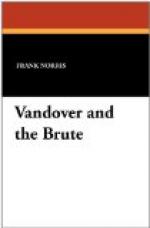For a long time Vandover stood undecided, changing the keys about from one hand to the other, hesitating before opening this iron box; he could not tell why. By and by, however, he went softly into his father’s room, and into the clothes closet near the head of the bed. Holding the key toward the lock, he paused listening; it was impossible to rid his mind of the idea that he was doing something criminal. He shook himself, smiling at the fancy, assuring himself of the honesty of the thing, yet opening the box stealthily, holding the key firmly in order that it might not spring back with a loud click, looking over his shoulder the while and breathing short through his nose.
The first thing that he saw inside was a loaded revolver, the sudden view of which sent a little qualm through the pit of his stomach. He took it out gingerly, holding it at arm’s length, throwing open the cylinder and spilling out the cartridges on the bed, very careful to let none of them fall on the floor lest they should explode.
Next he drew out the familiar little canvas sack. In it were twenty-dollar gold-pieces, the coin that used to be “Good for the Masses.” Behind that was about thirty dollars in two rolls, and last of all in an old, oblong tin cracker-box a great bundle of papers. A list of these papers was pasted on one end of the box. They comprised deeds, titles, insurance policies, tax receipts, mortgages, and all the papers relating to the property. Besides these there was the will.
He took out this box, laying it on the shelf beside him. He was closing the small iron safe again very quietly when all at once, before he could think of what he was doing, he ran his hand into the mouth of the canvas sack, furtively, slyly, snatched one of the heavy round coins, and thrust it into his vest pocket, looking all about him, listening intently, saying to himself with a nervous laugh, “Well, isn’t it mine anyway?”
In spite of himself he could not help feeling a joy in the possession of this money as if of some treasure-trove dug up on an abandoned shore. He even began to plan vaguely how he should spend it.
However, he could not bring himself to open any of the papers, but sent them instead to a lawyer, whom he knew his father had often consulted. A few days later he received a typewritten letter asking him to call at his earliest convenience.
It was at his residence and not at his office that Vandover saw the lawyer, as the latter was not well at the time and kept to his bed. However, he was not so sick but that his doctor allowed him to transact at least some of his business. Vandover found him in his room, a huge apartment, one side entirely taken up by book-shelves filled with works of fiction. The walls were covered with rough stone-blue paper, forming an admirable background to small plaster casts of Assyrian bas-reliefs and large photogravures of Renaissance portraits. Underneath an enormous baize-covered table in the centre of the room were green cloth bags filled apparently with books, padlocked tin chests, and green pasteboard deed-boxes. The lawyer was sitting up in bed, wearing his dressing-gown and occasionally drinking hot water from a glass. He was a thin, small man, middle-aged, with a very round head and a small pointed beard.




